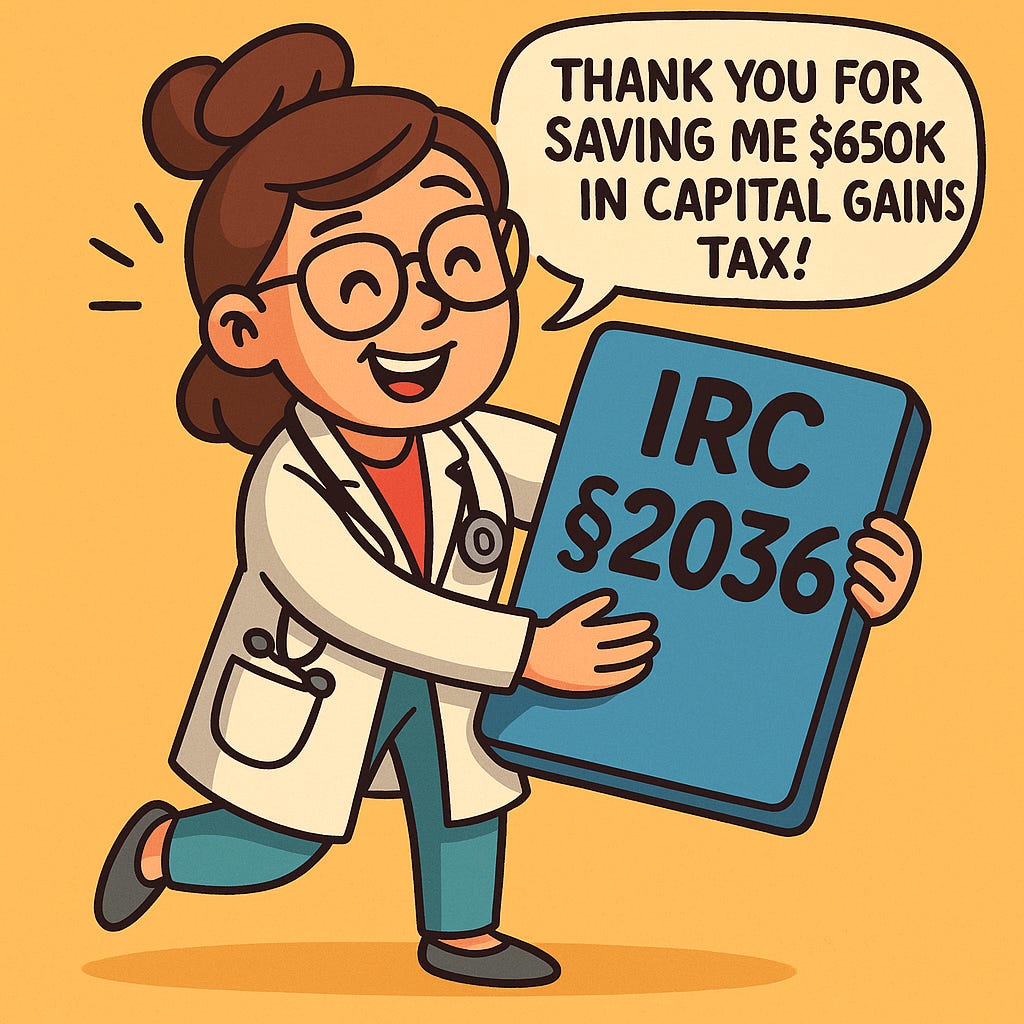This $650,000 Home-Gifting Mistake Happens Every Day
How IRC §2036 Saved Dr. Heart From a Massive Tax Bill
We’ve all heard it: “Never gift your house to your children.”
Every tax advisor says it. Even Tik-Tok tax “experts” repeat it.
And yes—there’s very good reason behind this conventional wisdom.
When you gift your home, your child receives your basis, not the current fair market value. So, if your child sells it shortly receiving it, they could face a massive capital gain - and a painful tax bill.
The Classic Nightmare Scenario:
Mom bought her Silicon Valley home in 1970 for $100,000.
Today it’s worth $2 million. No major improvements.
She gifts it to her daughter. The daughter sells it shortly after.
Result:
$1.9 million of capital gain ($2M sales price - $100,000 basis).
Combined federal, California, and NIIT taxes =~ $650,000.
A terrible tax outcome.
But What if Mom Doesn’t gift the Home?
If Mom leaves the property to her daughter through her will, everything changes.
The daughter receives the home with a step-up in basis to the fair market value of of $2 million.
She sells it the next day for $2M
Result:
$0 capital gains ($2M sales price - $2M stepped-up basis)
ZERO capital gains tax.
An amazing tax outcome.
That’s why the conventional wisdom - “never gift your home to your children” - exists and is usually the right call.
But Real-Life Situations Can be More Complicated
Not every family fits neatly into general tax advice.
One of my clients, Dr. Heart, found herself right in the middle of this dilemma.
Her mom, living only on Social Security, could no longer afford the upkeep and property taxes on the Silicon Valley home she bought 50 years ago. She wanted to give the home - now worth $2M - to her daughter so she could live worry-free.
Dr. Heart, a successful private cardiologist for tech executives, agreed:
“Okay mom, I’ll take care of it.”
When she came to me, she wanted my final sign-off before accepting the property.
At first, I repeated the standard advice:
“Don’t do it, Dr. Heart - you’re about to give me a heart attack! Let your mom keep the home, and you cover the upkeep and taxes so you can get a step-up in basis when she passes.”
But something about her situation made me take a deeper look.
And that’s when I remembered a tax code provision that unlocked the perfect solution: Internal Revenue Code §2036.
It completely changed the game.
The Perfect Solution: IRC §2036
Section 2036 says that if someone transfers property but keeps the right to live in it for life (a “life estate”), the property is still included in their estate at death.
Translation: even if Mom gifts the home to Dr. Heart today, as long as Mom keeps the right to live there until she passes, the home is pulled back into Mom’s estate when she dies.
And that triggers the most valuable outcome of all: a full step-up in basis.
So if the home is worth $2.5 million when Mom passes, Dr. Heart’s basis becomes $2.5 million!
All of those decades of built-in appreciation?
Gone for capital gains purposes!
A simple structure - gift plus retained life estate - completely preserve the step-up.
It’s like a performing a perfect triple bypass and watching the ejection fraction return to a strong 60% - a beautiful recovery with the best possible outcome for Dr. Heart.
The Win-Win
For Dr. Heart’s situation, the gift-plus-retained-life estate strategy created a truly mutually beneficial tax outcome:
Mom keeps living in her home for life, without the burden of upkeep or property taxes.
Dr. Heart takes over the taxes and maintenance, and still receive a step-up in basis when Mom passes.
Dr. Heart avoids a massive capital gains tax bill, even if the home is sold the day after Mom’s death.
It’s not the right solution for every family —vbut when the facts line up, this structure can solve multiple problems at once and preserve a tremendous amount of wealth.
The Bottom Line
“Never gift your house to your children” is a solid general advice, but like most things in tax, it may not be the perfect solution in every situation.
If a parent wants to gift their home because they can no longer maintain it, gifting the property while retaining a life estate allows them to keep living in the house and preserve the step-up in basis, eliminating the capital gains problem entirely.
That’s the power of truly understanding the tax code: finding real-life solutions that make sense for your family.
Not loopholes. Just smart planning.



